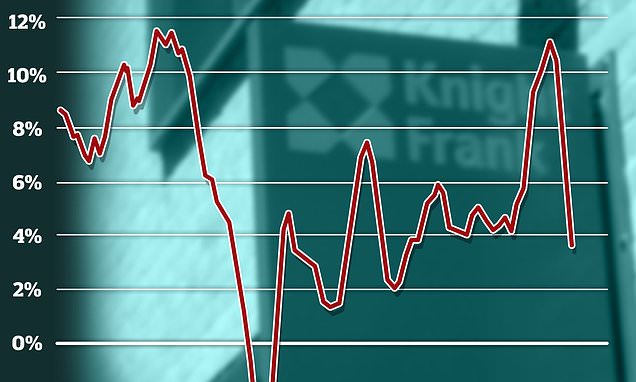
- UK falls from 26th to 47th place in Knight Frank’s Global House Price Index
- Property buying agent tells This is Money buyers should take advantage
The UK has plummeted from 26th to 47th place in global rankings for house price growth over the past year, Knight Frank’s latest Global House Price Index reveals.
Year-on-year, property prices in the UK fell by 3.1 per cent, Knight Frank says, while in the last six months they have fallen by 5.6 per cent, it added.
The UK’s spot in the global property house price growth rankings is now only four places higher than Ukraine, which rests in 52nd place, having seen property prices fall 7.8 per cent over the last year amid the ongoing war.
Property prices in the UK have fallen while inflation remains high and many households battle with higher mortgage rates and repayments.
The average interest rate for a five-year fixed mortgage has topped 6 per cent for the first time since the mini-Budget fallout in November, according to data from Moneyfacts this week.
Related Articles
HOW THIS IS MONEY CAN HELP
Property prices in 56 countries around the world rose at the slowest pace since 2015 in the last year, Knight Frank’s rankings reveal.
Annual global house price inflation slowed to 3.6 per cent in the 12 months to the first quarter of 2023, down from growth of 5.7 per cent.
However, while global house prices contracted 0.6 per cent in the final three months of 2022, they rose by 1.5 per cent in the first three months of 2023.
During the past year, South Korea, New Zealand, Hong Kong and Sweden saw property prices fall by 15.7 per cent, 13 per cent, 10.3 per cent and 8.8 per cent respectively.
New Zealand saw one of the biggest falls in prices globally in the last year.
While house prices in New Zealand are likely to fall further, the speed and depth of the correction suggest that an uptick in both demand and eventually prices will come back up earlier than in many other developed markets, according to Knight Frank.
Australia and Denmark also fared worse than the UK in the rankings, coming in 48th and 49th place respectively, with both seeing house prices fall over 5 per cent annually, Knight Frank added.
At the other end of the spectrum, Turkey led the rankings again last quarter, but its property price growth of 132.8 per cent in the year to March 2023 is largely a consequence of ‘rampant inflation’, Knight Frank said.
It added: ‘A 22 per cent quarterly rise in house prices there in Q1 suggests there is more to come this year.’
The US came in at 39th place in the rankings, having seen property prices rise by 0.7 per cent in the last year, but fall by 1.1 per cent on a six-month comparative.
Spain, an ever-popular destination for Britons looking to buy a property abroad, saw house prices rise over 3 per cent in the last year, leaving the country resting in 29th place in Knight Frank’s latest league table.
Eastern and south-eastern European countries dominated the top of the rankings with North Macedonia, Croatia and Hungary all showing strong annual growth of over 15 per cent.
Singapore was the top performer in the Asia-Pacific region, with 11.3 per cent annual growth.
Knight Frank said: ‘Recent changes to tax policy in Singapore have mainly targeted overseas buyers to try to cool rising prices, though there were enough domestic buyers to push prices to new highs. The Urban Redevelopment Authority is releasing new sites for development as it seeks to increase housing supply.’
Looking ahead, Knight Frank said ‘risks’ remain for many global property markets, with the biggest being high inflation.
It said: ‘Headline rates are falling in most locations, but core inflation remains stubbornly high in the UK, the US and Europe.
‘While we might be closing in on peak interest rates, the downward pivot may be further away than anticipated even a month or so ago. The first cuts in policy rates may be delayed to the second half of 2024 for several key markets, which would lower transactions and market liquidity for 12-months or more.’
Liam Bailey, global head of research at Knight Frank, said: ‘While the latest data reveals a substantial slowdown in annual price growth, quarterly growth improved.
‘Global house prices contracted 0.6 per cent in the final three months of 2022 yet saw a 1.5 per cent rise in the first three months of 2023.
‘On its own, this reversal doesn’t confirm that global markets are set to improve – rather, it does highlight that tight supply, limited new housing construction and strong household formation are acting to underpin prices in many markets.’
Some links in this article may be affiliate links. If you click on them we may earn a small commission. That helps us fund This Is Money, and keep it free to use. We do not write articles to promote products. We do not allow any commercial relationship to affect our editorial independence.






